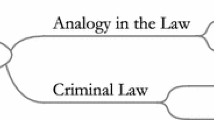Abstract
Robots and Artificial Intelligence are conquering our world. Just as any progress, this development is expected to have a relevant impact on law in general as well as on criminal law in particular. It involves the potential of transforming our conception of criminal responsibility, as notions of personhood, capacity and culpability will not stay unaffected. This article aims at giving an overview of the potential conversion criminal law is facing due to the increased importance of robotics and of artificial intelligence in our everyday lives. The discussion starts with an overview of different scenarios of criminal liability in the context of robotics. While some of them can be faced with existing doctrines, others demand a more far reaching assessment of the question if robots could ever gain legal personhood and therefore be originally called to account. While the picture of robots as liable perpetrators seems implausible at first sight, the present analysis reveals that blameworthiness is inherently socially constructed. However, it is not randomly constituted and follows social interaction and social meaning in fulfilling a certain function. Enabling the possibility of robots’ criminal liability therefore would require that robots are regarded as a suitable agent of responsibility. The article lights up the conditions for such social and legal change in rethinking the very nature of culpability having the overall function of criminal law in mind. It can be concluded that the on-going technological progress definitely has the potential of testing the theory of criminal responsibility while more clearly unveiling its foundations and its sociological implications. A guilty robot, however, as fictional as that appears today, may be nothing unrealistic nor unlikely in the future.
Similar content being viewed by others
Author information
Authors and Affiliations
Corresponding author
Additional information
Monika Simmler, PhD, Postdoctoral Fellow of Criminal Law, Law of Criminal Procedure and Criminology at the University of St. Gallen, Tigerbergstrasse 21, 9000 St. Gallen, Switzerland. E-mail: monika.simmler@unisg.ch.
Nora Markwalder, Assistant Professor of Criminal Law, Law of Criminal Procedure and Criminology at the University of St. Gallen, Bodanstrasse 4, 9000 St. Gallen, Switzerland. E-mail: nora.markwalder@unisg.ch.
Rights and permissions
About this article
Cite this article
Simmler, M., Markwalder, N. Guilty Robots? – Rethinking the Nature of Culpability and Legal Personhood in an Age of Artificial Intelligence. Crim Law Forum 30, 1–31 (2019). https://doi.org/10.1007/s10609-018-9360-0
Published:
Issue Date:
DOI: https://doi.org/10.1007/s10609-018-9360-0




